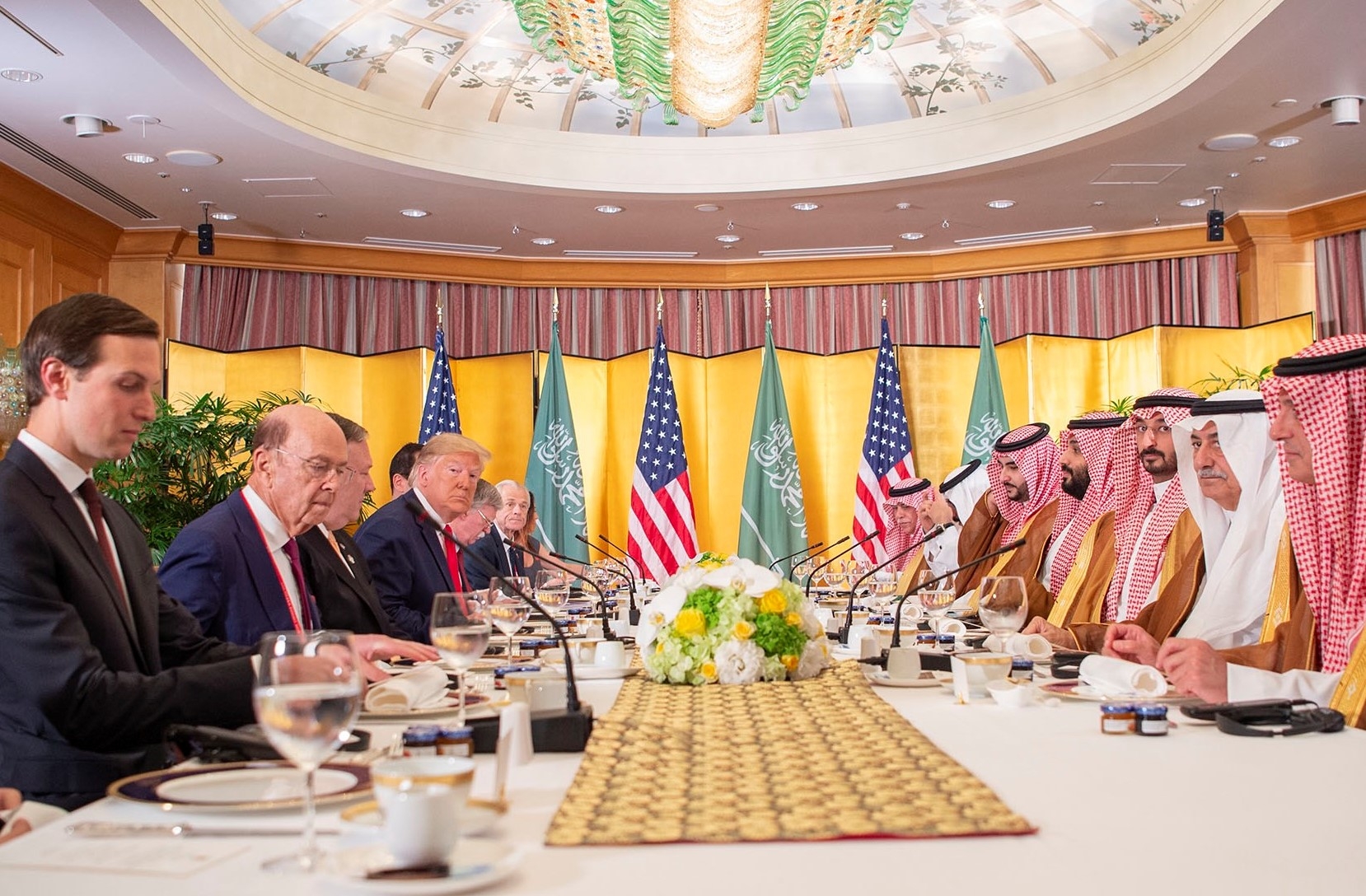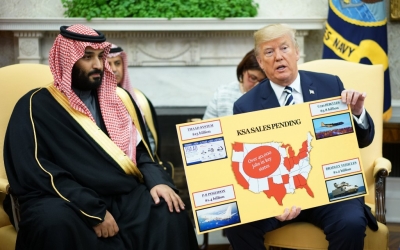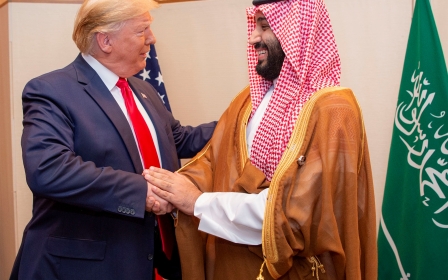Republicans and Democrats question Trump's alliance with Saudi Arabia

Democrats and Republicans are often radically divided in their views on Donald Trump's policies.
But on the Senate Committee on Foreign Relations on Wednesday, members from both major parties joined to express their outrage over the US president's recent decision to bypass Congress to sell weapons to Saudi Arabia and the United Arab Emirates.
Their irritation with Trump's pro-Saudi policies was obvious, as legislators questioned US State Department official Clarke Cooper over the deal.
"I want to compliment you, assistant secretary Cooper, on managing to achieve a rare moment of bipartisanship on this committee," said Democratic Senator Chris Coons.
On 23 May, US Secretary of State Mike Pompeo issued an emergency declaration to push through more than $8bn in weapon sales to Saudi Arabia and the UAE, citing increased tensions with Iran.
'The process that the State Department followed for these weapon sales - not to put too fine a point on it - is crap'
- Ted Cruz, Republican senator
US law requires the State Department to present major weapon sales to Congress, giving lawmakers the authority to block the deals.
Republican Senator Ted Cruz, a staunch Texas conservative who is close to Trump, had decried the emergency declaration, urging the administration to "follow the damn law and respect it".
"I have to say I agree with the concerns that have been expressed in this hearing on both sides of the aisle," Cruz said on Wednesday.
"The process that the State Department followed for these weapon sales - not to put too fine a point on it - is crap."
While he called the Saudis "deeply problematic allies", he said he supports arming the Gulf kingdom in order to create a regional "counterweight" to Iran, which he described as the "world's leading state-sponsor of terrorism".
Still, the Republican senator warned Cooper that he will side against the Trump administration if it issues another unfounded emergency declaration.
After the State Department issued the emergency order, the Senate voted in favour of 22 separate resolutions to halt the arms purchases.
The measures still need to be approved by the US House of Representatives, however, and Trump is expected to veto them should they land on his desk.
The president probably has enough support in Congress to uphold his veto - meaning the resolutions are unlikely to come into effect.
Still, they signal a major break between the president and some members of his Republican Party, many of whom have repeatedly raised concerns about Trump's coziness with Saudi leaders, including Crown Prince Mohammed bin Salman.
US-Saudi relations questioned
Earlier on Wednesday, the Republican chairman of the Senate Committee on Foreign Relations introduced a bill that calls for a "comprehensive review" of US-Saudi relations.
Senator Jim Risch's proposal would direct administration officials to report to Congress about various aspects of domestic and foreign Saudi policies, including the war in Yemen and human rights abuses in the kingdom.
Still, it stops short of halting US arms sales to Riyadh.
At the Cooper hearing, Risch recognised lawmakers' frustrations with Saudi Arabia and called on his colleagues to support his measure.
While acknowledging that his bill may not go far enough for some legislators, he said the focus should be on "developing a bipartisan method for reevaluating" Washington's partnership with Riyadh.
"It has headed south on us since about 2015," he said of the relationship.
"Unfortunately, it's right at the time when our challenges from Iran are getting substantially more significant, as we try to respectfully and reasonably impose the sanctions for what they're doing."
'How would sales that would not be delivered for many, many months immediately respond to an emergency?'
- Bob Menendez, Democratic senator
For his part, the top Democrat on the committee, Bob Menendez, pressed Cooper about why Pompeo did not alert lawmakers about the emergency when he briefed them only three days before it was declared.
"It is insulting to the Senate ... I find that overwhelmingly amazing to try to believe that all of a sudden an emergency came up, just right after we were briefed - preposterous," Menendez said.
Several legislators stressed that many of the weapons included in the deal have not been delivered to Saudi Arabia yet.
That, they argued, proves that there is no real emergency, as that would require an immediate transfer of arms.
"How would sales that would not be delivered for many, many months immediately respond to an emergency?" Menendez asked.
'Demonstration of resolve'
Cooper, who serves as assistant secretary of state for political-military affairs, said the emergency declaration was meant as a show of support for US allies in the Middle East - and aimed to "deter war" and attacks by Iran.
"Our partners required the reassurance provided by an American demonstration of resolve," Cooper said during the hearing on Wednesday.
But many senators sounded unconvinced, as they decried Saudi Arabia's human rights abuses and the mounting civilian death toll in Yemen, where Saudi-led coalition forces have led a war against the country's Houthi rebels since 2015.
Democratic Senator Tim Kaine questioned the president's ties to Riyadh, noting several occasions in which Trump has come to Saudi Arabia's defence in defiance of US lawmakers.
Indeed, over the past year, the White House has shielded Saudi Arabia's powerful crown prince from congressional efforts to reassess the alliance between Washington and Riyadh.
Before the emergency weapons sale, Trump vetoed a congressional resolution that aimed to halt US support for the Saudi war efforts in Yemen.
The president has also ignored a deadline mandated by the Global Magnitsky Act, a US human rights law, to report to Congress on whether bin Salman was involved in the murder of Saudi journalist Jamal Khashoggi.
"There are a series of instances with this administration where in response to congressional action - and in some cases clear congressional mandate - in matters dealing with Saudi Arabia that the administration is taking very unusual action," Kaine said.
Middle East Eye propose une couverture et une analyse indépendantes et incomparables du Moyen-Orient, de l’Afrique du Nord et d’autres régions du monde. Pour en savoir plus sur la reprise de ce contenu et les frais qui s’appliquent, veuillez remplir ce formulaire [en anglais]. Pour en savoir plus sur MEE, cliquez ici [en anglais].






